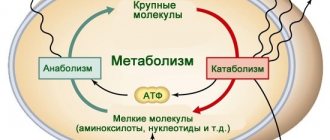Metabolic process: what is it? Factors associated with it
Today, when talking about weight loss, doctors often mention the term “metabolism”. What is this in simple terms? How exactly is this process related to weight loss?
In simple terms, metabolism is the metabolism that takes place in the body of absolutely every living creature. Metabolic process also refers to the rate at which the body converts food into energy. Every second more than a thousand chemical processes occur in our body. Their combination is a metabolic process. It is worth noting that men's metabolism is much faster than women's. The speed of this process is directly related not only to gender, but also to the physique of a person. It is for this reason that people who are overweight have a slower metabolism. Other important factors that influence the metabolic process are heredity and the general hormonal background of the body. If you notice that your body's metabolism has become significantly slower, this may be due to diet, stress, exercise, or taking medications.
What substances are missing in metabolism:
In addition to the above, these may be:
- Lack of iodine, phosphorus, sulfur.
- Or manganese, zinc, nitrogen.
- Possibly carbon, hydrogen, calcium, magnesium.
- Sodium, potassium, iron, copper.
The list can be continued for a long time, but this can result in weakness, severe disturbances in the functioning of the heart and blood vessels, and bone damage.
- We can easily live without food for two months.
- Without water for about seven days.
- Just a few minutes without oxygen.
Well, what conclusion suggests itself? Miracles don't happen, unfortunately. We will have to change all life stereotypes:
- Nutrition.
- Movement.
- Healthy habits.
Normalize levels:
- Blood sugar.
- Lipids.
- Body cholesterol.
- Normalization of hormonal levels.
Only this way and nothing more.
Three types of metabolism
Matter and energy are closely related. They are important components of the metabolic process. There are three types of metabolism:
- base;
- active;
- digestive.
Basic metabolism is the energy that the body expends to maintain and normal function vital organs. It ensures the functioning of the heart, lungs, kidneys, digestive tract, liver and cerebral cortex.
Active metabolism is the energy needed for physical activity. It is worth noting that the more a person moves, the faster the metabolic process occurs in his body.
Digestive metabolism is the energy that the body needs to digest the food it receives. Fatty and fried foods take much longer to break down than healthy foods. It is for this reason that those who want to lose weight, but like to treat themselves to baked goods, carbonated drinks and many other unhealthy foods, urgently need to reconsider their diet.
Plastic and energy metabolism
Air, water and food enter the body. In it, these substances are transformed, and excess heat, metabolic products and undigested food residues are released from the body.
Metabolism is the totality of all chemical changes and all types of transformations of substances and energy in the body, ensuring its development, vital activity, self-reproduction and connection with the environment.
General information about metabolism in the body is given in the article “METABOLISM AND ENERGY TRANSFORMATION IN THE CELL“.
❖ Main types of metabolism: ■ plastic metabolism ( assimilation, anabolism ) and ■ energy metabolism ( dissimilation, catabolism ).
Plastic metabolism (or assimilation, anabolism ) is a set of biochemical reactions for the formation of complex biopolymers from simple molecules, leading to the renewal of the structural parts of cells and tissues and requiring energy .
Plastic exchange includes:
■ supply from the external environment of substances necessary for the body;
■ transformation of incoming substances into compounds acceptable to body tissues;
■ synthesis of complex biopolymers (proteins, nucleic acids, etc.) from simple organic molecules;
■ synthesis of structural units of cells and replacement of obsolete structural parts of cells and tissues;
■ deposition (deposition) of nutrient reserves in the body.
Energy metabolism (or dissimilation, catabolism ) is a set of biochemical reactions of the breakdown of complex organic substances supplied with food or present in the body itself, as a result of which, firstly, the energy necessary for the body is extracted and, secondly, simple compounds are formed . Energy metabolism includes:
■ breakdown of energy-intensive compounds (carbohydrates, fats, some proteins) and release of the energy contained in them; in this case, part of the released energy is dissipated in the form of heat, and part is stored in the form of high-energy phosphate bonds of ATP molecules, which subsequently provide energy for the synthesis of molecules of organic substances necessary for the body, maintaining the vital functions of the body and performing work (muscular and mental);
■ breakdown of complex biopolymers (proteins, carbohydrates) into simple compounds, which serve as the starting material for the synthesis of complex biopolymers in the process of assimilation;
■ decomposition of obsolete tissue elements;
■ removal of decay products from the body;
■ mobilization of body reserves.
The processes of assimilation and dissimilation are interconnected and occur simultaneously in the body. At the same time, during different periods of life, one of the types of exchange may predominate.
For example, during the period of intensive growth of the body, the processes of plastic metabolism predominate, and during intense physical work, the processes of energy metabolism predominate.
End products of metabolism
Over time, the end products of metabolism and the organs responsible for metabolism have changed significantly. Excretory processes are directly related to metabolic processes. In mammals, the body contains a third type of kidney, the metanephros. It is she who participates in the formation of final products.

Thanks to metabolism, the final products are formed - water, urea and carbon dioxide. All of them subsequently leave the body naturally. Metabolic organs that participate in the process of removing end products from the body:
- kidneys;
- liver;
- leather;
- lungs.
Protein metabolism in the body
Protein is one of the most important components in our body. It is involved in the formation of cells, tissues, muscles, enzymes, hormones and many other important components of our body. Proteins that enter the body are broken down in the intestines. It is there that they are converted into amino acids and transported to the liver. Metabolism is responsible for this important process for humans. It is worth paying attention to the fact that protein poisoning is possible when consuming large amounts of protein. The World Health Organization recommends consuming no more than 75 grams per 1 kilogram of body weight per day.
Carbohydrates
Biological processes in the body play an important role in human well-being. Metabolism is involved in the breakdown of not only proteins, but also carbohydrates. Due to this, fructose, glucose and lactose are formed in the body. Typically, carbohydrates enter the human body in the form of starch and glycogen. With prolonged carbohydrate starvation, glucose enters the blood.

Carbohydrates are the main source of energy. If they are deficient, a person’s performance is significantly reduced and their well-being worsens. Carbohydrates are an important component for the normal functioning of the nervous system. If a person notices such signs as weakness, headache, drop in temperature and convulsions, then he needs to first pay attention to his daily diet. It is the lack of carbohydrates that is a common cause of poor health.
Metabolic syndrome
Metabolic syndrome is a complex of disorders that occur in overweight people. As a consequence of poor metabolism and obesity, a person may develop insulin resistance. This disease can be hereditary or acquired. It is worth noting that along with metabolic syndrome, other changes also occur in the tissues and systems of the body. With metabolic syndrome, the patient may also experience intrinsic obesity. This can cause the development of cardiovascular diseases, diabetes and atherosclerosis. The main cause of the syndrome is metabolic disorders. People who eat fast food or eat on the go are most susceptible to it. Metabolic syndrome often occurs in those who lead a sedentary lifestyle. Scientists have confirmed that excess weight is directly related to high mortality from all types of cancer.

To diagnose metabolic syndrome, you need to pay attention to your blood glucose levels. The very first sign is the presence of fat in the abdominal area. Quite often, metabolic syndrome is associated with blood pressure. In people who have problems with metabolism, it increases for no reason.
In order to get rid of metabolic syndrome, you must first lose weight. To do this, you will need to move as much as possible and reconsider your diet. Experts recommend that patients who complain of metabolic syndrome regularly visit the massage room and swimming pool. These procedures can significantly improve metabolism. It must also be remembered that drinking alcohol and smoking reduce the metabolic process. In the fight against the disease, you will need to give up bad habits.
The main cause of metabolic syndrome is an unhealthy diet. First of all, you need to give up simple carbohydrates and replace them with complex ones. To do this, give preference to cereals rather than flour and sweets. When fighting metabolic syndrome, food must be under-salted. It is important to include vegetables and fruits in your diet. They are rich in vitamins and microelements.
Normalization results
Once your metabolism is restored to normal, this will affect your health and well-being:
- normalization of digestion, liver and kidney function, blood pressure;
- general improvement in well-being;
- increasing concentration and performance;
- losing weight or, conversely, gaining weight;
- reducing the risk of exacerbations of chronic diseases;
- stabilization of hormonal levels;
- in women - normalization of the menstrual cycle;
- improvement in appearance: the skin becomes smooth, hair becomes thick and begins to grow, nails become strong, without splitting;
- elimination of chronic fatigue, cheerfulness, energy, high spirits, absence of depressing thoughts.
Gastritis: general information
Often, metabolic disorders are the cause of gastritis. With this disease, the patient experiences inflammation of the gastric mucosa. Today, gastritis occurs in both adults and children. The first symptom is a slowdown in metabolism. As a result, the patient experiences a loss of strength and lack of energy. With gastritis, a person may experience heaviness in the stomach, heartburn, vomiting, bloating and flatulence.
For patients with gastritis, the following is contraindicated:
- fatty food;
- alcohol;
- spicy;
- carbonated drinks.
At the first symptoms of gastritis, you should urgently consult your doctor. He will not only recommend a diet that will improve metabolic processes in the body, but also prescribe a course of medications.
Chronic pancreatitis
Chronic pancreatitis is a disease caused by metabolic disorders. With this disease, inflammation of the pancreas is observed. Pancreatitis most often occurs in middle-aged and elderly women. A patient with pancreatitis experiences the following symptoms:
- nausea;
- decreased appetite;
- pain in the stomach;
- nausea.
If you have pancreatitis, you need to change your diet and include healthy foods in it. It is undesirable to eat fatty and fried foods. It is necessary to give preference to products prepared by steaming or in the oven. When diagnosed with gastritis, the patient must completely abandon bad habits.

Reasons for acceleration and deceleration
Scientists are still studying what determines metabolic rate. A number of reasons have been scientifically confirmed, but in some cases the provoking factors are very difficult to identify.
Causes of slow metabolism:
- intrauterine hypoxia;
- age after 35;
- gender differences: in women it proceeds more slowly;
- genetics;
- deficiency of minerals and vitamins;
- diet, lack of calories;
- thyroid diseases;
- slagging of the body;
- menopause;
- improper functioning of the adrenal glands and pituitary gland;
- incorrect eating habits: lack of diet, snacking on the go, abuse of unhealthy foods;
- dehydration;
- constant stress, prolonged depression, frequent nervous breakdowns;
- birth injuries;
- childbirth;
- sedentary lifestyle, lack of physical activity.
Causes of accelerated metabolism:
- alcoholism;
- genetics;
- prolonged and very severe stress;
- long-term use of powerful medications;
- grueling workouts;
- addiction;
- heredity;
- lack of sleep, insomnia;
- excessive physical activity (at work or in the gym);
- extensive inflammatory processes;
- excess muscle mass;
- living or working in low temperatures;
- severe, complicated infections;
- traumatic brain injury if the hypothalamus was affected;
- endocrine pathologies: acromegaly, hypercortisolism, hyperthyroidism, thyroiditis, hyperaldosteronism, goiter, thyrotoxicosis, hyperprolactinemia, Stein-Leventhal syndrome, etc.
Most experts consider hormonal imbalance to be the main cause of metabolic disorders, since hormones are their regulators.
Irritable bowel syndrome. General information about the disease
Irritable bowel syndrome is a set of metabolic disorders that last for 3 months or more. Symptoms of this disease are stomach pain, flatulence and bowel dysfunction. Typically, irritable bowel syndrome is most common in young people aged 25-40 years. The causes of the disease include poor nutrition, an inactive lifestyle and changes in general hormonal levels.

When treating irritable bowel syndrome, a gastroenterologist will prescribe a number of tests and a diet for the patient. By following all the recommendations, the patient will be able to quickly and painlessly get rid of the disease.
How to speed up your metabolism?
When fighting excess weight, first of all, we stimulate metabolic processes. However, not everyone knows how to do it correctly. You can find all the necessary recommendations in our article. It is known that metabolism occurs most quickly in those people whose age ranges from 11 to 25 years. Many experts argue that metabolic rate directly depends on a person’s temperament. Changes in metabolism may be associated with the presence of infections in the body.
To normalize or accelerate metabolic processes, you first need to move as much as possible. To improve metabolism, it is recommended to combine strength and cardio training. Evening walks are also recommended. This is no coincidence, because it is after this that metabolic processes continue even in sleep.
To restore metabolic processes, many experts recommend visiting a sauna and bathhouse once a week. Thanks to this, in addition to speeding up your metabolism, you will improve blood circulation. If you do not have the opportunity to visit the bathhouse and sauna, then you can carry out therapeutic procedures in the bathroom. To do this, you must use water whose temperature is more than 38 degrees.
To speed up your metabolism, it is important to review your diet. It is necessary to drink at least two liters of water daily. The diet should contain only healthy and balanced foods.

Complications

Improper metabolism can trigger the development of the disease:
- anemia;
- atherosclerosis;
- infertility;
- painful muscle contractions;
- hepatosis;
- hyper- or hypoglycemia;
- glycogenosis;
- dystrophy;
- gout;
- weight problems;
- mental disorders;
- rickets;
- diabetes.
And this is not the entire list of sad forecasts for those who neglect themselves and do not control metabolic processes.











